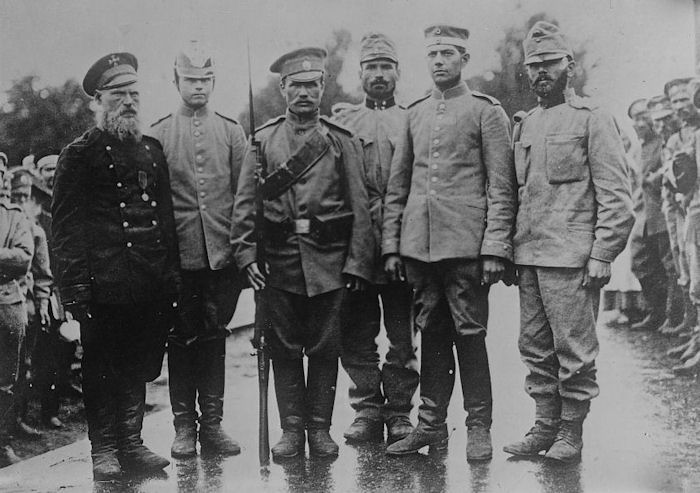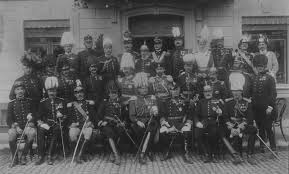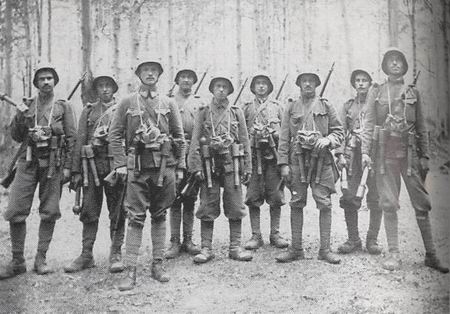Austrian Troops Throw Down Their Weapons, Then Surrender.
Germany in Control of Eastern Front
Special to The Great War Project.
(Editor’s note: Catastrophe, A Blog of World War One, will take a short break. It will return next week.)
(16-20 June) By now, in the spring of 1915, Austria-Hungary’s army is coming apart.
On the Eastern Front, the Russians are in retreat. But not as a result of Austrian successes. The Germans are smashing the Russians. They have come to the rescue of Austria-Hungary.
“Even with German help,” writes historian Geoffrey Wawro, “its army lay shattered on a line that wended from Poland along the crests of the Carpathians and all the way south to Bosnia.”
The Austro-Hungarian Empire, also known as the Dual Monarchy or the Habsburg monarchy, encompasses present-day Austria and Hungary as well as Croatia, Bosnia, and parts of Poland and Czechoslovakia.
“The very meaning of Austria had been shattered too,” writes Wawro. “Beaten too many times to count, the Dual Monarchy had lost whatever respect it had commanded from its subjects and neighbors, and lost any semblance of cohesion or for that matter sovereignty.”
“Its days on the earth were numbered.”
The state of the Austrian army is so bad, its generals are ordered “to reeducate their troops on the purpose of the war,” Wawro reports. The Austrian troops are fighting, they are told, “because England, France, and Russia had conspired to make Germany and Austria-Hungary ‘slave peoples.’”
“The greatest slave driver of the three was Russia…a rich, backward land…where corruption finds a home everywhere and the masses live in poverty and ignorance.”
Russia is the cause of the war, the racist Austrian narrative goes – “hordes of Asiatic and half-Asiatic barbarians” outnumbering the Austrians four to one.
By the spring of 1915 “no one believed these fictions,” reports Wawro. “The romantic nonsense of a happy empire of united peoples that had undergirded the army in peacetime had dissolved entirely under the stress of war.”
The Germans take over the war effort on the Eastern Front, contemptuously observes Wawro, and very efficiently. In their spring offensive “they killed and wounded 1.4 million Russians and captured a million more. It was shocking what a little artillery could do.”
The Russians are stunned by the German attacks, and they turn around and run.
Lieutenant Harry Kessler, a German officer who takes part in this offensive, describes the “wreckage of an Austro-Hungarian attack: Millions of flies and a thick, humid atmosphere…the forest thickly sown with corpses. All Austrian. The faces all completely black, already half rotted, covered with filth and dirt…
Observes Kessler, “It was one of the bloodiest affairs of this war and completely without point or consequence.”
In the face of their terrible losses, the Austrians are facing a severe shortage of manpower. “The monarchy was a cruel, bone-crushing machine,” observes Wawro. It runs through its prime draft men “in the most careless fashion.”
A French analysis concludes Austria-Hungary has already “consumed” most of the men available.
One-million are dead, half from combat, half from infection and disease.
Why does the Austrian army experience near total collapse? According to Wawro, “everyone who had been anywhere near the front knew the answers: the Austrian troops didn’t care, and they had lost the will to endure life on the march and in the trenches.”
“When released from their trenches and ordered to march, legions of them simply sat down by the side of the road and waited to be captured.”
What to conclude from this disaster? Many agree with Geoffrey Wawro that Austria-Hungary is not “the essentially decent but charmingly slipshod power that muddled into and through the war. It…thought nothing of throwing all of Europe into the flames to preserve its ancient right to lands like Bohemia and Hungary…that were trying to break away.
“Austria’s Great War was built on the reckless gamble that the monarchy’s internal problems could be fixed by war.
“They couldn’t.”




Mike, thanks for adding this post to the time line of WWI.
What transpired 100 years ago is just overwhelming in numbers and locations.
Incredible to me that the war will continue until 1918 after these losses.
Appreciate this service very much. Very enjoyable to track the wreckage of our civilization week to week.
I’m no Austrian, but this post about Austro-Hungary seems more than a little tendentious. I assume you are an American? I’m not sure why the Dual Monarchy attracted so much revulsion among Americans, although I have a couple hunches. I think the Austrian perspective – meaning the Imperial and Royal, not the current-day post-modernist welfare state, would be a very interesting perspective to hear. Unfortunately it is long lost, at least to the English speaking world. Some of the statements in this post are downright venomous against the Austrians, going far beyond their supposed military ineptitude. The Austrian declaration of war against Serbia was not wholly unjustified, was it, and, after all, lets remember the German Kaiser was by far the most eager for war, and manipulated the situation accordingly. Interesting how Wawro doesn’t mention this.
Thanks though
RM